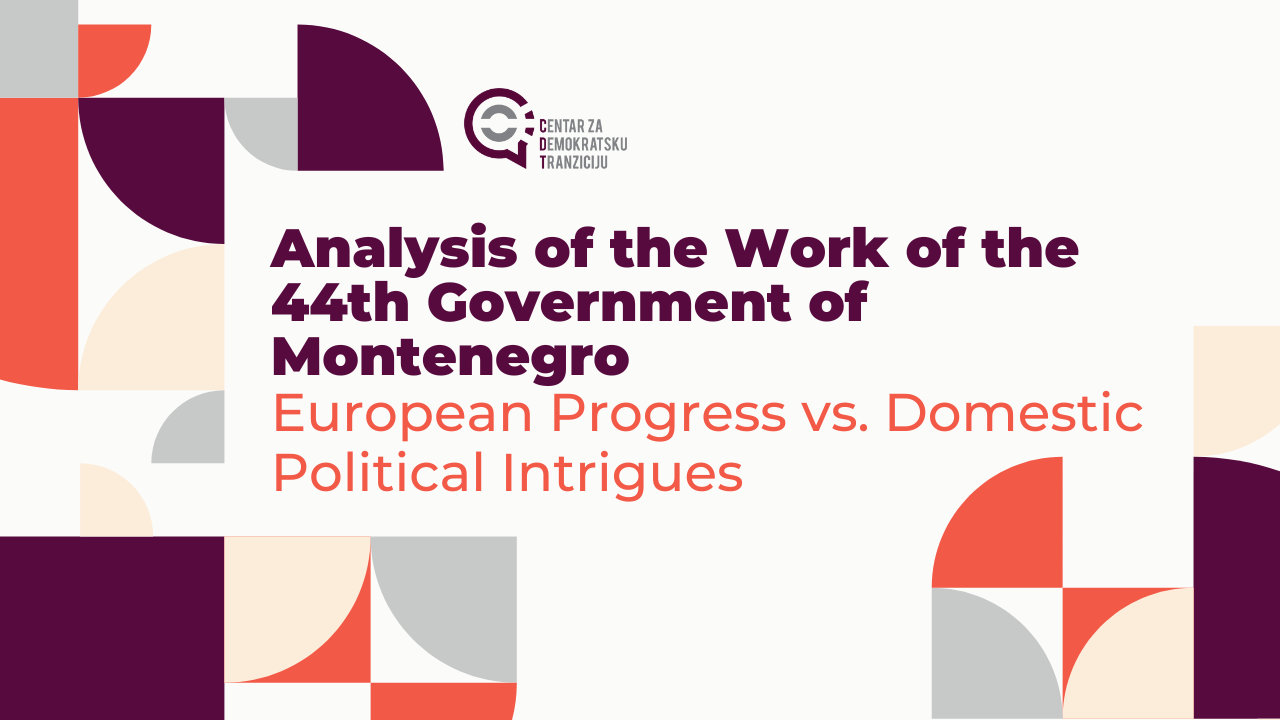The most significant achievement during this period was the conclusions of the Intergovernmental Conference, where EU member states approved the granting of final benchmarks for Chapters 23 and 24. On the other hand, the lack of transparency, the adoption of the resolution on Jasenovac, struggles for dominance in the security sector, the non-functioning of the Security Council, the absence of electoral reform, and the failure to adopt laws on the Parliament, Government, and freedom of information remain causes for concern.
Following our review of the 44th Government of Montenegro’s work program and coalition governance, and the results achieved in the first 100 days, Center for Democratic Transition (CDT) presents the third analysis of the quality of the work of the government performance, covering the period from February to the end of July 2024, focusing on areas within our organization’s purview.
Undoubtedly, securing IBAR is a major success and a strategic step towards EU membership, which previous governments failed to achieve. Montenegro has prepared updated strategies for combating corruption and reforming the judiciary and has adopted a set of relevant laws in these areas, as well as media law. The favorable geopolitical moment has also seen Brussels adopt a different stance on the enlargement process.
However, despite these achievements, the adopted strategic documents and laws on judicial and anti-corruption reforms have bypassed fundamental reforms, and their adoption process was neither fully transparent nor inclusive. Media laws fell victim to the political struggle for dominance over public broadcasting service, while present-day challenges related to digital media regulation and combating misinformation have been neglected.
The entire process of adopting the IBAR laws has been accompanied by a dynamic political environment, where the coalition government has at times failed to demonstrate its European, democratic, or even “pro-Western” values.
Just one day after this significant success came a negative shock in the form of the passing of the Resolution on Genocide in Jasenovac and the camps of Dachau and Mauthausen, which caused significant domestic and international turbulence. The adoption of this document provoked fierce reactions from the opposition and a significant part of civil society, as well as differing views within PES and the ruling coalition regarding its necessity. On the international stage, there were official reactions from the Government of Croatia, the visit by European Council President Charles Michel was canceled, and there were clear messages about the need for Montenegro to “remain on the European path.”
The events leading up to proclaiming July 11 as the International Day of Reflection and Commemoration of the 1995 Genocide in Srebrenica further highlighted serious foreign policy disagreements within the ruling coalition. The response to this was adopting the resolution on Jasenovac, demonstrating that the Government was making compromises that could harm Montenegro.
The observed period was marked by a political clash between PES and the Democrats over the appointment of high-ranking police officials. The marathon “midnight” session preceding the appointment of the Acting Director of Police stands as a significant testament to how political structures remain “obsessed” with this sector.
The Security and Defense Council has been in a sort of state of paralysis, as its sessions have not been held for over five months, raising questions about fulfilling various NATO membership obligations, EU common security policy, and partially, the functioning of the military system.
The ongoing ping-pong between the Government and the Parliament, which for yet another time prevented the adoption of the crucial Law on Free Access to Information, indicates a continued lack of political will to increase government transparency.
Electoral reform was largely blocked throughout the observed period, and the announcement of the controversial law on dual citizenship has significantly distanced the already inefficient Committee on Comprehensive Electoral Reform from success. Additionally, the Government fails to adopt laws on the Parliament and Government – laws that the current ruling coalition representatives firmly advocated and promised while in opposition.
After nine months, the Government presented the Europe Now 2 program but continued to perform poorly regarding public administration reform, maintaining a problematic stance towards the media, especially those critical of its work.
The full publication, Analysis of the Work of the 44th Government of Montenegro: European Progress vs. Domestic Political Intrigues, can be found here.
Center for Democratic Transition (CDT)
This publication was produced with the support of the SMART Balkan regional project – Civil Society for a Connected Western Balkans, implemented by the Center for Civil Society Promotion (CPCD), Center for Research and Policy Making (CRPM), and Institute for Democracy and Mediation (IDM), and financially supported by the Ministry of Foreign Affairs of the Kingdom of Norway.
The content of this publication is the sole responsibility of the authors and does not necessarily reflect the views of the Center for Civil Society Promotion, Center for Research and Policy Making (CRPM), Institute for Democracy and Mediation, or the Ministry of Foreign Affairs of the Kingdom of Norway.


